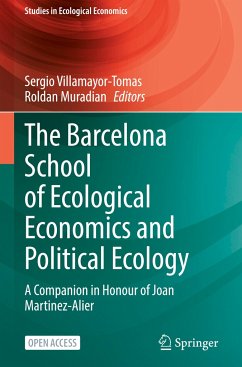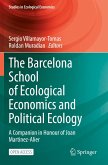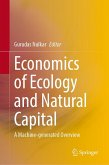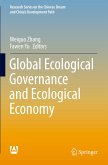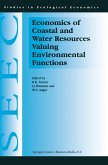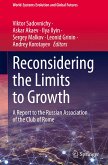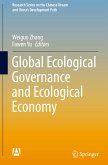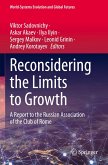The Barcelona School of Ecological Economics and Political Ecology
A Companion in Honour of Joan Martinez-Alier
Herausgegeben:Villamayor-Tomas, Sergio; Muradian, Roldan
The Barcelona School of Ecological Economics and Political Ecology
A Companion in Honour of Joan Martinez-Alier
Herausgegeben:Villamayor-Tomas, Sergio; Muradian, Roldan
- Gebundenes Buch
- Merkliste
- Auf die Merkliste
- Bewerten Bewerten
- Teilen
- Produkt teilen
- Produkterinnerung
- Produkterinnerung
In this open access book, ecological economics and political ecology traditions converge into a single academic school. The book constitutes a common ground where multiple and critical voices are expressed, covering a broad scope of urgent matters at the crossroad between society, economy and the natural environment. The manuscripts composing this compendium offer appealing material for both experienced and younger researchers interested in interdisciplinary exchanges in the field of the social environmental sciences. It combines historical accounts with recent theoretical and empirical…mehr
Andere Kunden interessierten sich auch für
![The Barcelona School of Ecological Economics and Political Ecology The Barcelona School of Ecological Economics and Political Ecology]() The Barcelona School of Ecological Economics and Political Ecology33,99 €
The Barcelona School of Ecological Economics and Political Ecology33,99 €![The Intersection of Economics and Ecology The Intersection of Economics and Ecology]() The Intersection of Economics and Ecology113,99 €
The Intersection of Economics and Ecology113,99 €![Global Ecological Governance and Ecological Economy Global Ecological Governance and Ecological Economy]() Global Ecological Governance and Ecological Economy121,99 €
Global Ecological Governance and Ecological Economy121,99 €![Economics of Coastal and Water Resources: Valuing Environmental Functions Economics of Coastal and Water Resources: Valuing Environmental Functions]() Economics of Coastal and Water Resources: Valuing Environmental Functions125,99 €
Economics of Coastal and Water Resources: Valuing Environmental Functions125,99 €![Reconsidering the Limits to Growth Reconsidering the Limits to Growth]() Reconsidering the Limits to Growth129,99 €
Reconsidering the Limits to Growth129,99 €![Global Ecological Governance and Ecological Economy Global Ecological Governance and Ecological Economy]() Global Ecological Governance and Ecological Economy121,99 €
Global Ecological Governance and Ecological Economy121,99 €![Reconsidering the Limits to Growth Reconsidering the Limits to Growth]() Reconsidering the Limits to Growth129,99 €
Reconsidering the Limits to Growth129,99 €-
-
-
In this open access book, ecological economics and political ecology traditions converge into a single academic school. The book constitutes a common ground where multiple and critical voices are expressed, covering a broad scope of urgent matters at the crossroad between society, economy and the natural environment. The manuscripts composing this compendium offer appealing material for both experienced and younger researchers interested in interdisciplinary exchanges in the field of the social environmental sciences. It combines historical accounts with recent theoretical and empirical developments revolving around the interaction between three foundational notions of the Barcelona School: social metabolism, environmental justice and self-reflective science.
Produktdetails
- Produktdetails
- Studies in Ecological Economics 8
- Verlag: Springer / Springer International Publishing / Springer, Berlin / Universitat Autònoma de Barcelona
- Artikelnr. des Verlages: 978-3-031-22565-9
- 1st ed. 2023
- Seitenzahl: 428
- Erscheinungstermin: 1. März 2023
- Englisch
- Abmessung: 241mm x 160mm x 27mm
- Gewicht: 883g
- ISBN-13: 9783031225659
- ISBN-10: 3031225651
- Artikelnr.: 66269455
- Herstellerkennzeichnung Die Herstellerinformationen sind derzeit nicht verfügbar.
- Studies in Ecological Economics 8
- Verlag: Springer / Springer International Publishing / Springer, Berlin / Universitat Autònoma de Barcelona
- Artikelnr. des Verlages: 978-3-031-22565-9
- 1st ed. 2023
- Seitenzahl: 428
- Erscheinungstermin: 1. März 2023
- Englisch
- Abmessung: 241mm x 160mm x 27mm
- Gewicht: 883g
- ISBN-13: 9783031225659
- ISBN-10: 3031225651
- Artikelnr.: 66269455
- Herstellerkennzeichnung Die Herstellerinformationen sind derzeit nicht verfügbar.
Sergio Vilamayor-Tomas is an environmental social scientist trained in political science (Master's in Public Policy at Sciences Po Paris), and in institutional and ecological economics (PhD Environmental Policy and Management, at the Ostrom Workshop in Political Theory and Policy Analysis, Indiana University). He has held positions at Humboldt University and the Swiss Federal Institute for Forest Snow and Landscape Research (WSL-ETH). Currently he is Ramon y Cajal researcher at the Institute of Environmental Science and Technology (ICTA), Autonomous University of Barcelona (UAB). His research interests revolve around collective action theory and its application to the study of community-based natural resource management, conservation instruments, climate change adaptation and environmental justice movements. He has carried field research in the Global South (Mexico and Colombia) and North (Spain, Germany, Switzerland, and the US), and combined quantitative and qualitative methods, including economic and choice experiments, large-n survey research, qualitative comparative analysis and qualitative meta-analyses. Roldan Muradian holds a PhD in ecological economics from the Autonomous University of Barcelona. He works currently at the Faculty or Economics of the Universidade Federal Fluminense, in Rio de Janeiro, Brazil. He has worked at the universities of Tilburg and Nijmegen (the Netherlands). During the period 2022-2023 he will be the President of the International Society for Ecological Economics. His research interests include a wide range of issues, including environmental governance, global value chains and human-nature relations.
Preface 1. A Grateful appreciation of Joan Martinez-Alier (Herman Daly).- Preface 2. Memories concerning the career of Joan Martinez-Alier (Laurence Whitehead).- Preface 3. Conversations with a Catalan polymath (Ramachandra Guha).- Preface 4. Joan Martinez-Alier and the crisis of civilization, knowledge, and the human species (Victor Toledo).- Part I. Introduction.- Chapter 1. Justification and scope of the book (Roldan Muradian and Sergio Villamayor-Tomas).- Chapter 2. A Barcelona school of ecological economics and political ecology (Joan Martinez-Alier).- Chapter 3. The Barcelona School of ecological economics and political ecology: Building bridges between moving shores (Sergio Villamayor-Tomas, Brototi Roy and Roldan Muradian).- Part II. Epistemological foundations.- Chapter 4. Metaphysical midwifery and the living legacy of Nicholas Georgescu-Roegen (Katharine N. Farrell).- Chapter 5. Languages of valuation (Christos Zografos).- Chapter 6. Post-development: From the critique of development to a pluriverse of alternatives (Federico Demaria, Ashish Kothari, Ariel Salleh, Arturo Escobar and Alberto Acosta).- Chapter 7. Indigenous and local knowledge and social-ecological systems (Victoria Reyes-García).- Chapter 8. Degrowth and the Barcelona school (Giorgos Kallis).- Part III. Social metabolism.- Chapter 9. Agrarian metabolism and socio-ecological Transitions to agroecology Landscapes (Enric Tello and Manuel González de Molina).- Chapter 10. Multi-scale integrated analysis of societal and ecosystem metabolism (Mario Giampietro).- Chapter 11. Materials flow analysis in Latin America (Mario Alejandro Pérez-Rincón).- Chapter 12. Biophysical approaches to food system analysis in Latin America (Jesus Ramos-Martin and Fander Falconí).- Chapter 13. Ecologically unequal exchange: the renewed interpretation of Latin American debates by the Barcelona School (Beatriz Macchione Saes).- Chapter 14. Flow/Fund Theory and Rural Livelihoods (Jose Carlos Silva-Macher).- Chapter 15.Deceitful decoupling: misconceptions of a persistent myth (Alevgul H. Sorman).- Part IV. Environmental justice conflicts and alternatives.- Chapter 16. Does the social metabolism drive environmental conflicts? (Arnim Scheidel).- Chapter 17. A critical mapping for researching and acting upon environmental conflicts - the case of the EJAtlas (Daniela Del Bene and Sofia Ávila).- Chapter 18. The EJAtlas: an unexpected pedagogical tool to teach and learn about environmental social sciences (Mariana Walter, Lena Weber, Leah Temper).- Chapter 19. Commons regimes at the crossroads: environmental justice movements and commoning (Sergio Villamayor-Tomas, Gustavo García-López and Giacomo D'Alisa).- Chapter 20. (In)justice in urban greening and green gentrification (Isabelle Anguelovski).- Chapter 21. From the soil to the soul: Fragments of a theory of economic conflicts (Julien-François Gerber).- Part V. Science and self-reflected activism.- Chapter 22. Activism Mobilising Science Revisited (Marta Conde and Martí Orta-Martínez).- Chapter 23. Iberian Anarchism in Environmental History (Santiago Gorostiza).- Chapter 24. The Barcelona School of ecological economics and social movements for alternative livelihoods (Claudio Cattaneo).- Chapter 25. The ups and downs of feminist activist research: positional reflections (Sara Mingorria, Rosa Binimelis, Iliana Monterroso, Federica Ravera).- Chapter 26. From the environmentalism of the poor and the indigenous towards decolonial environmental justice (Brototi Roy and Ksenija Hanacek).- Part IV. Public policy applications.- Chapter 27. Agrobiodiversity in Mexican Environmental Policy (Nancy Arizpe and Dario Escobar-Moreno).- Chapter 28. Conventional climate change economics: a way to define the optimal policy? (Jordi Roca and Emilio Padilla).- Chapter 29. Contribution of global cities to climate-change mitigation overrated (Jeroen C.J.M. van den Bergh).- Chapter 30. Reconciling Waste Management and ecological economics (Ignasi Puig Ventosa).- Chapter 31. Work and needs in a finite planet: Reflections from ecological economics (Erik Gómez-Baggethun).- Chapter 32. Collective action in Ecuadorian Amazonia (Fander Falconía and Julio Oleas).- Chapter 33. The environmentalism of the paid (Esteve Corbera and Santiago Izquierdo-Tort).- Index.
Preface 1. A Grateful appreciation of Joan Martinez-Alier (Herman Daly).- Preface 2. Memories concerning the career of Joan Martinez-Alier (Laurence Whitehead).- Preface 3. Conversations with a Catalan polymath (Ramachandra Guha).- Preface 4. Joan Martinez-Alier and the crisis of civilization, knowledge, and the human species (Victor Toledo).- Part I. Introduction.- Chapter 1. Justification and scope of the book (Roldan Muradian and Sergio Villamayor-Tomas).- Chapter 2. A Barcelona school of ecological economics and political ecology (Joan Martinez-Alier).- Chapter 3. The Barcelona School of ecological economics and political ecology: Building bridges between moving shores (Sergio Villamayor-Tomas, Brototi Roy and Roldan Muradian).- Part II. Epistemological foundations.- Chapter 4. Metaphysical midwifery and the living legacy of Nicholas Georgescu-Roegen (Katharine N. Farrell).- Chapter 5. Languages of valuation (Christos Zografos).- Chapter 6. Post-development: From the critique of development to a pluriverse of alternatives (Federico Demaria, Ashish Kothari, Ariel Salleh, Arturo Escobar and Alberto Acosta).- Chapter 7. Indigenous and local knowledge and social-ecological systems (Victoria Reyes-García).- Chapter 8. Degrowth and the Barcelona school (Giorgos Kallis).- Part III. Social metabolism.- Chapter 9. Agrarian metabolism and socio-ecological Transitions to agroecology Landscapes (Enric Tello and Manuel González de Molina).- Chapter 10. Multi-scale integrated analysis of societal and ecosystem metabolism (Mario Giampietro).- Chapter 11. Materials flow analysis in Latin America (Mario Alejandro Pérez-Rincón).- Chapter 12. Biophysical approaches to food system analysis in Latin America (Jesus Ramos-Martin and Fander Falconí).- Chapter 13. Ecologically unequal exchange: the renewed interpretation of Latin American debates by the Barcelona School (Beatriz Macchione Saes).- Chapter 14. Flow/Fund Theory and Rural Livelihoods (Jose Carlos Silva-Macher).- Chapter 15.Deceitful decoupling: misconceptions of a persistent myth (Alevgul H. Sorman).- Part IV. Environmental justice conflicts and alternatives.- Chapter 16. Does the social metabolism drive environmental conflicts? (Arnim Scheidel).- Chapter 17. A critical mapping for researching and acting upon environmental conflicts - the case of the EJAtlas (Daniela Del Bene and Sofia Ávila).- Chapter 18. The EJAtlas: an unexpected pedagogical tool to teach and learn about environmental social sciences (Mariana Walter, Lena Weber, Leah Temper).- Chapter 19. Commons regimes at the crossroads: environmental justice movements and commoning (Sergio Villamayor-Tomas, Gustavo García-López and Giacomo D'Alisa).- Chapter 20. (In)justice in urban greening and green gentrification (Isabelle Anguelovski).- Chapter 21. From the soil to the soul: Fragments of a theory of economic conflicts (Julien-François Gerber).- Part V. Science and self-reflected activism.- Chapter 22. Activism Mobilising Science Revisited (Marta Conde and Martí Orta-Martínez).- Chapter 23. Iberian Anarchism in Environmental History (Santiago Gorostiza).- Chapter 24. The Barcelona School of ecological economics and social movements for alternative livelihoods (Claudio Cattaneo).- Chapter 25. The ups and downs of feminist activist research: positional reflections (Sara Mingorria, Rosa Binimelis, Iliana Monterroso, Federica Ravera).- Chapter 26. From the environmentalism of the poor and the indigenous towards decolonial environmental justice (Brototi Roy and Ksenija Hanacek).- Part IV. Public policy applications.- Chapter 27. Agrobiodiversity in Mexican Environmental Policy (Nancy Arizpe and Dario Escobar-Moreno).- Chapter 28. Conventional climate change economics: a way to define the optimal policy? (Jordi Roca and Emilio Padilla).- Chapter 29. Contribution of global cities to climate-change mitigation overrated (Jeroen C.J.M. van den Bergh).- Chapter 30. Reconciling Waste Management and ecological economics (Ignasi Puig Ventosa).- Chapter 31. Work and needs in a finite planet: Reflections from ecological economics (Erik Gómez-Baggethun).- Chapter 32. Collective action in Ecuadorian Amazonia (Fander Falconía and Julio Oleas).- Chapter 33. The environmentalism of the paid (Esteve Corbera and Santiago Izquierdo-Tort).- Index.

